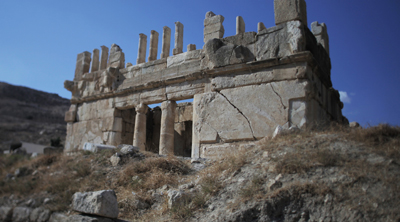Jews Under Islam
In this clip from The Story of the Jews, Simon Schama visits Cairo to explore the historical relationship between Jews and Islam.
Over a thousand years ago, Cairo was home to one of the most thriving Jewish communities in the world. And that story was repeated across the eastern Mediterranean and in Arabia itself, the birthplace of a powerful new monotheistic faith: Islam.
With no accusation of Christ-killing to contend with, Jews under Islamic rule were spared the demonization they suffered in Christendom. According to later Islamic sources, there seems to have been an early moment when Jews and Muslims might have been part of the Umma, the common community of believers.
The Jews had been in Medina for centuries before the arrival of Islam. They ran the city’s main market, as they did in many Arabian towns. They spoke Arabic and appear to have used the Arabic name for God, “Allah.” Yet the Jews of Medina simply couldn’t accept Muhammad as a new prophet of God. The Jewish religion fundamentally insisted that the age of prophets was over and that God no longer spoke directly to man.
Eventually, Medina’s Jews turned bitterly and publicly critical and were accused of treason. Between 624 and 627, two Jewish tribes were exiled from Medina, the men of a third tribe massacred, their women and children enslaved.
But the breathtaking success of the Arab conquest in the decades following the death of Muhammad transformed the antagonism of a rival into the lofty stance of a victor. Islam would soon spread all the way from Spain to Afghanistan. Secure within the borders of their empire, Muslims treated Jews and Christians as dhimmis – tolerated inferiors.
In this clip from The Story of the Jews, Simon Schama visits Cairo to explore the historical relationship between Jews and Islam.
Over a thousand years ago, Cairo was home to one of the most thriving Jewish communities in the world. And that story was repeated across the eastern Mediterranean and in Arabia itself, the birthplace of a powerful new monotheistic faith: Islam.
With no accusation of Christ-killing to contend with, Jews under Islamic rule were spared the demonization they suffered in Christendom. According to later Islamic sources, there seems to have been an early moment when Jews and Muslims might have been part of the Umma, the common community of believers.
The Jews had been in Medina for centuries before the arrival of Islam. They ran the city’s main market, as they did in many Arabian towns. They spoke Arabic and appear to have used the Arabic name for God, “Allah.” Yet the Jews of Medina simply couldn’t accept Muhammad as a new prophet of God. The Jewish religion fundamentally insisted that the age of prophets was over and that God no longer spoke directly to man.
Eventually, Medina’s Jews turned bitterly and publicly critical and were accused of treason. Between 624 and 627, two Jewish tribes were exiled from Medina, the men of a third tribe massacred, their women and children enslaved.
But the breathtaking success of the Arab conquest in the decades following the death of Muhammad transformed the antagonism of a rival into the lofty stance of a victor. Islam would soon spread all the way from Spain to Afghanistan. Secure within the borders of their empire, Muslims treated Jews and Christians as dhimmis – tolerated inferiors.
Find educational resources related to this program - and access to thousands of curriculum-targeted digital resources for the classroom at PBS LearningMedia.
Visit PBS Learning Media


